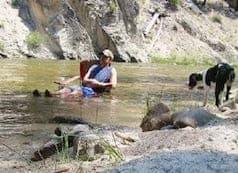world gathers for metal finishing
Q&As since 1989
-----
U.S. MIL spec Type III Hardcoat vs German Hardcoat
2007
Q. I need to repeat German Hardcoat Anodizing thickness .0043" which is originally on
AIMgSi 0.5 F22. I am using U.S. Analog 6063 T6.
In the rev of MIL-A-8625 / MIL-PRF-8625
[on DLA] F Type III Hardcoat calls for a thickness up to .005"
My Anodizer can only achieve a max .0026" without further explanation.
Anodizing layer is clear, color is not important. The German Anodizing color is Dark Bronze. U.S. Anodizing is Tan.
Abrasion resistance and wear is extremely critical to handle linear plastic bearings continuous movement.
Why is there such a big difference in the color? Why is it so difficult to achieve required thickness?
Thank you.
- Jupiter, Florida, USA
A. Color varies with: alloy, temperature, current density, and concentration; not to overlook the frequency of accidentally and deliberately mis-identifying the alloy. Also consider the range of ingredients in an alloy. Also consider that some imported alloys are not anywhere close to the reliability of the USA big three aluminum smelters.

Robert H Probert
Robert H Probert Technical Services
Garner, North Carolina

2007
A. It's easy to make hardcoat thicker by raising the electrolyte temperature and lowering the current density, etc. All those things make a softer, less dense, less abrasion resistant hardcoat. You probably don't want to match the German thickness!
I googled "hardcoat anodize maximum thickness 6063" and up pop several job shop anodizing shops that report the maximum practical thickness on 6063 as 0.0035". In my experience, getting much over 2.5 mils is difficult.
The mil spec specifies 0.0020 ± 0.0004" and a maximum abrasion resistance. There is a reason for that - if you get 0.0043" thick, you better ensure the abrasion resistance isn't off the map!

Milt Stevenson, Jr.
Syracuse, New York
2007
April 6, 2009
Q. I need help for anodizing process Al 6061-t6.
We are making a component for mobile phones. The products have an anodizing coating of sulfuric acid. The customer require 90 µm--of the thickness of anodizing coating, but we have a problem about the coating thickness. What is the method over 2.5 mil thick?
we are process...
concen. :16~18%vol. sulfuric acid.
temp.: 0 ~ -3°
type of current: D.C
anodizing time :1.5 ~ 2 hours
agitation of electrolyte: high
- South Korea
Hard Anodizing - Recommended Thickness
Q. What thickness of hard anodizing gives the best results for corrosion, hardness and density?
I heard that as coatings become thicker the density reduces usually around the 30 µm thickness area. MIL-A-8625 / MIL-PRF-8625
[on DLA]F defaults all hard anodizing to 50 µm ± 20% (Section 3.7.2.1 Page 6). I've had items hard anodized to 20 µm with fantastic salt spray corrosion hours, solid density and it was deemed this 20 µm was optimum.
Any thoughts appreciated.
- Cumbria U.K.
October 10, 2016
|
A. Karl - Green Mountain Falls, Colorado October 17, 2016 A. Tough question to answer. Anodizing is not like painting to where anyone can open a can of paint, and the end results are basically the same as long as good practices are followed.  Marc Green anodizer - Boise, Idaho October 18, 2016 A. Hi Karl, Aerospace - Yeovil, Somerset, UK October 18, 2016 |
Q, A, or Comment on THIS thread -or- Start a NEW Thread
